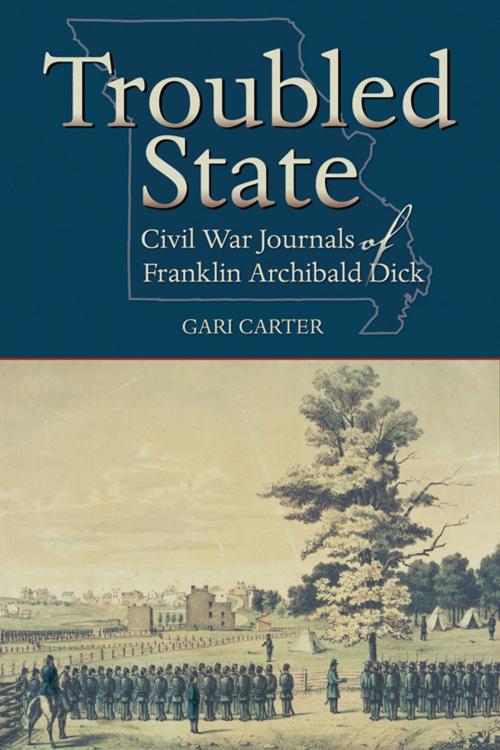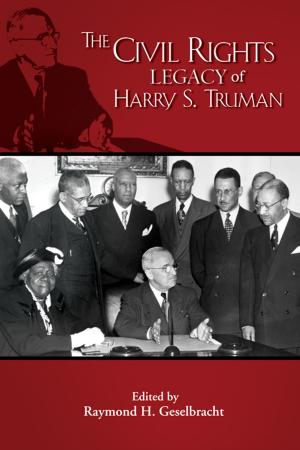Troubled State
Civil War Journals of Franklin Archibald Dick
Nonfiction, History, Americas, United States, Civil War Period (1850-1877)| Author: | Gari Carter | ISBN: | 9781935503866 |
| Publisher: | Truman State University Press | Publication: | July 30, 2014 |
| Imprint: | Language: | English |
| Author: | Gari Carter |
| ISBN: | 9781935503866 |
| Publisher: | Truman State University Press |
| Publication: | July 30, 2014 |
| Imprint: | |
| Language: | English |
In his private journals, Franklin Archibald Dick, a St. Louis attorney, Union officer, and provost marshal, wrote of his concerns about keeping Missouri pro-Union during the turbulent Civil War years. His firsthand perspective of important historical events includes the early Camp Jackson incident when he was Captain Nathaniel Lyon's assistant adjutant general, and when he served as Missouri's provost marshal general under Major General Samuel Curtis. Dick was troubled by the slow progress and terrible cost of the war. For him, the divided city of St. Louis was heartbreaking, and his journal entries changed from early optimism to later doubts about his future due to the war and his loyalty to the Union. After the war, Dick practiced law with Montgomery Blair, President Lincoln's postmaster general. Gari Carter's great-great-grandfather never intended for anyone to read the private worries in his journals. His views on the politics and daily life of the country, state, and leaders he knew, and his concerns about morality, were thoughts he usually kept to himself. Pressures from the war changed the entries from optimistic to sorrowful and doubtful about the future, and he asked, “In what does happiness consist?” Franklin Dick's record of American life during the Civil War gives us an irreplaceable new perspective on the impact of history in our lives. Buried for years in family files, this important firsthand Civil War account of Franklin Dick's experiences as Union assistant adjutant general and Missouri provost marshal general gives a new view of politics, power, and divided loyalties in the state of Missouri. It is filled with the intrigue and emotion of major Civil War figures Nathaniel Lyon, Frank Blair, John C. Frémont, and Abraham Lincoln. Troubled State is a new resource for library collections, historians, and Civil War buffs.
In his private journals, Franklin Archibald Dick, a St. Louis attorney, Union officer, and provost marshal, wrote of his concerns about keeping Missouri pro-Union during the turbulent Civil War years. His firsthand perspective of important historical events includes the early Camp Jackson incident when he was Captain Nathaniel Lyon's assistant adjutant general, and when he served as Missouri's provost marshal general under Major General Samuel Curtis. Dick was troubled by the slow progress and terrible cost of the war. For him, the divided city of St. Louis was heartbreaking, and his journal entries changed from early optimism to later doubts about his future due to the war and his loyalty to the Union. After the war, Dick practiced law with Montgomery Blair, President Lincoln's postmaster general. Gari Carter's great-great-grandfather never intended for anyone to read the private worries in his journals. His views on the politics and daily life of the country, state, and leaders he knew, and his concerns about morality, were thoughts he usually kept to himself. Pressures from the war changed the entries from optimistic to sorrowful and doubtful about the future, and he asked, “In what does happiness consist?” Franklin Dick's record of American life during the Civil War gives us an irreplaceable new perspective on the impact of history in our lives. Buried for years in family files, this important firsthand Civil War account of Franklin Dick's experiences as Union assistant adjutant general and Missouri provost marshal general gives a new view of politics, power, and divided loyalties in the state of Missouri. It is filled with the intrigue and emotion of major Civil War figures Nathaniel Lyon, Frank Blair, John C. Frémont, and Abraham Lincoln. Troubled State is a new resource for library collections, historians, and Civil War buffs.















